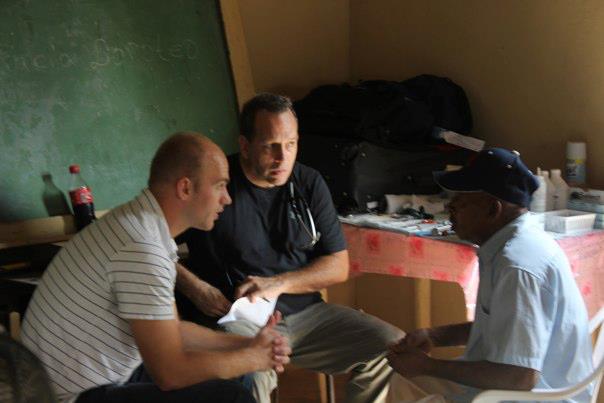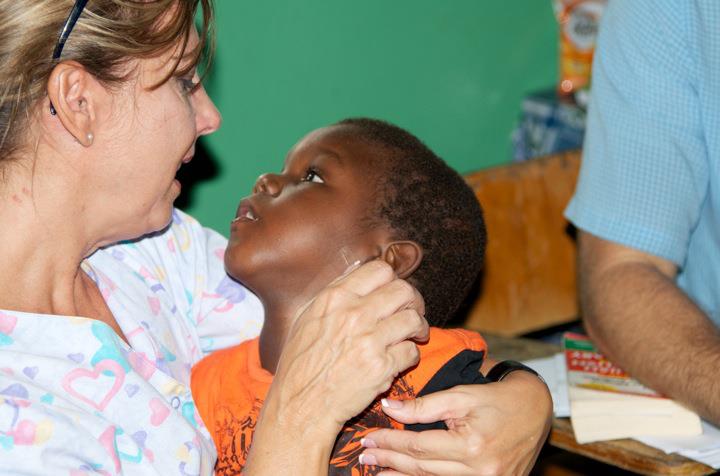On Friday, we drove an hour away from a very rural “city” to a sugar cane batey community. Within our micro-lending program we provide our associates the ability to receive medical treatment free of charge. Unfortunately, these services are few and far between, as they largely depend on the willingness and the resources of doctors or dentists from various organizations and churches.
We had the pleasure of working with two doctors and two nurses from Grace Community Church in Orlando, Florida. I was the translator for Scott, a doctor with an extensive career in primary care, ER,  and sports medicine. In addition to various assignments, he was the Orlando Magic doctor for quite some time. He and his wife Cissy, have a heart to serve, and for the past couple years have been doing more Christian mission work. They’ve got two grown kids, and three adopted kids. One child is from China and the other two are adopted locally in Orlando.
and sports medicine. In addition to various assignments, he was the Orlando Magic doctor for quite some time. He and his wife Cissy, have a heart to serve, and for the past couple years have been doing more Christian mission work. They’ve got two grown kids, and three adopted kids. One child is from China and the other two are adopted locally in Orlando.
After a long day, we were in the late afternoon still seeing patients when Cissy came up to me with a few tears in her eyes, and said,
“Just to let you know, they next family has a son that is Autistic. They are probably unfamiliar with what that means, because the grandmother said that ‘the boy is missing half of his brain.’ When they sit down, let me know, because we’d like to talk with them a little more. One of our adopted daughters has Asperbergs syndrome.”
A tired and frustrated grandmother sits down with the 5 year old in her lap. The mother of the boy is resting at home. The grandmother says to me, “He’s missing ‘half of his brain’ and he doesn’t want to eat, walk, talk, or learn. What can you do?” We’d been rushing through the patients all day trying to see the 115 listed on the schedule as kindly and efficiently as we could manage. Here though, the change in environment was immediate. Scott and Cissy both sat down and leaned in toward the family. Scott took off his stethoscope and said to me, “Aaron, I’m not really sure we are going to be able to prescribe anything for the young man, but what we need to do is to teach them how to love and live with a son with special needs. We went through this process six years ago with our girl.”
For the next 20 minutes, Scott worked with the young boy to see what mental faculties were present. To our surprise, the boy could walk, talk, dance, play, and was intrigued by Scott snapping his fingers and mimicked the action with his own hand. We tried to talk with the family that the boy needs a lot of dynamic involvement in his life. He needs to be played with, he needs to be sung to, he needs to be danced with, and most importantly, he needs to be loved. It was difficult; very, very difficult. The grandmother spoke mostly Creole, so her friend spoke Spanish to me, I translated to Scott, and Scott spoke English to me, back to Spanish, and then to Creole.
It wasn’t really a language barrier. It was more a barrier of education in a community that lacked any sort of medical resources, let alone the ability to know and how to work with special needs. In a community of 800 people of sugar cane workers, I’m not sure how many people had any formal education or medical knowledge. Scott says sometimes people can think that children are “just being difficult” or worse, “possessed.” The family was still frustrated, but I believe that their countenance changed when I told them that Scott and Cissy had a child with similar issues, and six years later, the child was much more active and involved in family life.
 They always say that you have “God moments” on trips like these. This was certainly one of them. And if I could point specifically to the most touching moment it would be when Cissy picked up the child in her arms and sang “Jesus loves me.” You can see from the picture here that he is completed enraptured in her eyes, and during the song he lifted up his arm to softly touch her face. I’m not sure if you can tell, but Cissy is weeping while she is singing.
They always say that you have “God moments” on trips like these. This was certainly one of them. And if I could point specifically to the most touching moment it would be when Cissy picked up the child in her arms and sang “Jesus loves me.” You can see from the picture here that he is completed enraptured in her eyes, and during the song he lifted up his arm to softly touch her face. I’m not sure if you can tell, but Cissy is weeping while she is singing.
By the end of our meeting with the family, the boy eased up and the family began to smile. Scott wanted one last hug with the child, and unlike the first time that he had the boy in his arms where the child was smacking his face, now, he was softly touching the side of his cheek. Scott too, was in tears. Both he and Cissy wanted to pray with the family. So I translated their prayer:
“God we know that you love each person as you created them. We know that you never make a mistake. We pray that you help us love him and nurture him. Give us the strength, the knowledge, and the patience to help him grow into what you have created him to be. May he know the love of his family, may he feel it deeply through song, through play, and through dance. And Lord, when we arrive in Heaven, we know that we will all be complete, and that we will all be able to celebrate and sing and dance and laugh as you intended us to be.”
We hugged the family, we smiled, we said our blessings, and they walked out of our clinic without any medications. We sat there kind of stunned. Cissy was still crying. Someone asked her what was wrong. She said, “Nothing’s wrong, I just want him to know that he is loved. I want him to know that he’s not sick, nor that he’s missing half of his brain. But that simply, his Heavenly father loves him and his family does too. Sometimes, we can get so frustrated and sidetracked by the condition that we forget to just love him. That’s all he needs.”
You can imagine what it must have felt like to be on holy ground there at our makeshift clinic. It was amazing how a little boy can reach out and touch us all.
